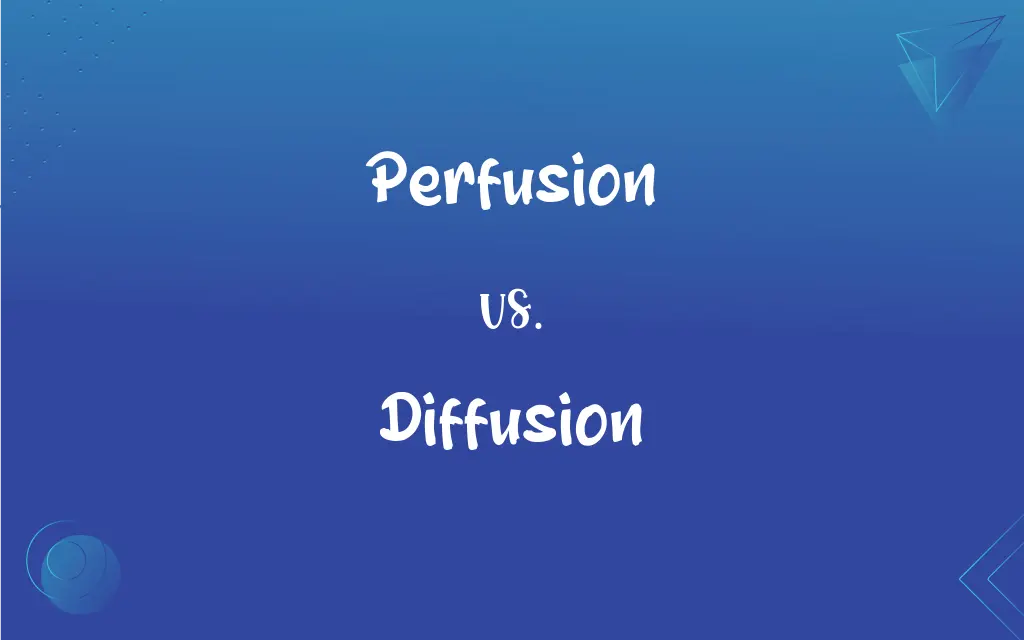Perfusion vs. Diffusion: What's the Difference?
Edited by Aimie Carlson || By Harlon Moss || Published on January 3, 2024
Perfusion refers to the flow of blood or other fluids through organs, while diffusion is the passive movement of molecules from high to low concentration.

Key Differences
Perfusion is the process of blood being delivered to tissue in the body, essential for supplying oxygen and nutrients. Diffusion, in contrast, is a fundamental physical process where particles spread from an area of higher concentration to an area of lower concentration.
In perfusion, blood flow is actively regulated by the body to meet tissue demands, involving complex physiological mechanisms. Diffusion, however, is a passive process driven by concentration gradients, not requiring energy.
Perfusion is critical in medical contexts, such as assessing blood flow in organs. Diffusion is key in many biological processes, like gas exchange in the lungs where oxygen diffuses from air sacs into blood.
Perfusion can be measured and altered in clinical settings, indicating the health of tissues. Diffusion rates are influenced by factors like temperature and the nature of the diffusing substance.
Perfusion is often enhanced or impaired by pathological conditions, requiring medical intervention. Diffusion is a constant natural phenomenon, essential for maintaining homeostasis in organisms.
ADVERTISEMENT
Comparison Chart
Definition
Flow of blood through organs
Movement of molecules from high to low concentration
Energy Requirement
Requires energy
Passive, no energy required
Biological Significance
Essential for organ function
Crucial for molecular transport
Dependency
Depends on blood flow and vascular health
Depends on concentration gradients
Measurement
Can be measured clinically (e.g., blood flow rate)
Measured by rate of spread of substances
ADVERTISEMENT
Perfusion and Diffusion Definitions
Perfusion
Perfusion is the delivery of oxygen and nutrients via the bloodstream.
Brain perfusion is critical for cognitive activities.
Diffusion
Diffusion is the movement of particles from an area of high concentration to low concentration.
Oxygen diffusion occurs in the lungs.
Perfusion
Perfusion is the circulation of blood through tissues or organs.
Adequate perfusion is vital for kidney function.
Diffusion
Diffusion in biology refers to the passive spread of molecules across membranes.
Nutrient diffusion is essential for cell survival.
Perfusion
Perfusion in medical imaging refers to the distribution of contrast material.
MRI perfusion helps visualize blood flow in the brain.
Diffusion
Diffusion is the process of a substance spreading throughout a space or medium.
Perfume diffusion fills a room with scent.
Perfusion
Perfusion refers to the process of blood flowing to and nourishing the heart.
Cardiac perfusion scans assess heart health.
Diffusion
Diffusion in social contexts refers to the spread of ideas or cultural practices.
The diffusion of technology has reshaped communication.
Perfusion
Perfusion is the passage of fluid through the lymphatic system.
Lymphatic perfusion plays a role in immune responses.
Diffusion
Diffusion in physics describes the intermingling of substances by random motion.
Gas diffusion is faster at higher temperatures.
Perfusion
The act or an instance of perfusing.
Diffusion
The process of diffusing or the condition of being diffused
The diffusion of new technology around the world.
Perfusion
The injection of fluid into a blood vessel in order to reach an organ or tissues, usually to supply nutrients and oxygen.
Perfusion
The act of perfusing
Perfusion
(medicine) The introduction of a drug or nutrients through the bloodstream in order to reach an internal organ or tissues.
Perfusion
The act of perfusing.
Perfusion
Pumping a liquid into an organ or tissue (especially by way of blood vessels)
FAQs
Is perfusion an active or passive process?
Perfusion is an active process, requiring energy.
What is perfusion?
Perfusion is the flow of blood or fluids through tissues or organs.
What is diffusion?
Diffusion is the passive movement of molecules from an area of higher to lower concentration.
What factors affect diffusion?
Temperature, medium, and concentration gradients affect diffusion.
Is diffusion important in the body?
Yes, diffusion is crucial for processes like gas exchange and nutrient transport.
How is perfusion measured?
Perfusion can be measured using imaging techniques like MRI or CT scans.
Can perfusion be altered medically?
Yes, perfusion can be influenced by medical interventions.
What is an example of perfusion in medicine?
Assessing blood flow in stroke patients is an example.
Does diffusion require energy?
No, diffusion is a passive process and does not require energy.
How does perfusion relate to organ health?
Poor perfusion can indicate compromised organ function.
Does diffusion require a membrane?
In biological systems, diffusion often occurs across membranes.
Can perfusion be a problem in diseases?
Yes, conditions like heart disease can impair perfusion.
Does diffusion play a role in plant life?
Yes, diffusion is key in processes like photosynthesis and respiration in plants.
How is perfusion used in diagnostics?
It helps in diagnosing conditions like ischemia or tumors.
Is diffusion rate the same for all substances?
No, it varies based on molecular size and the nature of the substance.
Why is perfusion important in surgery?
Maintaining adequate perfusion ensures tissue viability during surgery.
What affects perfusion in the human body?
Factors like blood pressure, vascular resistance, and cardiac output affect perfusion.
Is diffusion always constant?
The rate of diffusion can vary based on environmental factors.
Are perfusion and diffusion interrelated?
While different, both are essential for bodily functions and can impact each other.
Can diffusion occur in solids?
Yes, but it's much slower compared to liquids and gases.
About Author
Written by
Harlon MossHarlon is a seasoned quality moderator and accomplished content writer for Difference Wiki. An alumnus of the prestigious University of California, he earned his degree in Computer Science. Leveraging his academic background, Harlon brings a meticulous and informed perspective to his work, ensuring content accuracy and excellence.
Edited by
Aimie CarlsonAimie Carlson, holding a master's degree in English literature, is a fervent English language enthusiast. She lends her writing talents to Difference Wiki, a prominent website that specializes in comparisons, offering readers insightful analyses that both captivate and inform.








































































